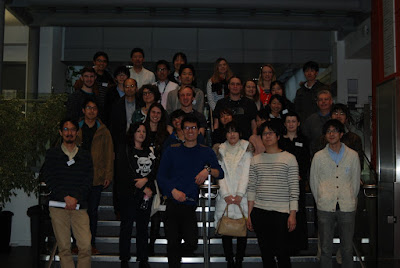 |
| A child feeds on orange fleshed sweet potato in Central Uganda – Image credit ‘Winnie Nanteza/NARO-Uganda’ |
World hunger continued to rise for the third consecutive year according to the UN’s Food and Agriculture Organization (FAO)’s latest report. The data identifies climate variability as one of the major contributing factors to this worrying statistic. The intricate relationship between climate change and food security culminates in a major challenge that has rattled individuals, organisations and governments alike for decades. In the coming decades, Africa—which faces the biggest food security challenge in present times—will need more strategic partnerships to unlock its food security potential.Nearly one in every nine people—a significant proportion of whom live in Sub-Saharan Africa—go to bed hungry every night. So significant is this challenge that the United nations lists ending hunger, achieving food and nutrition security and promoting sustainable agriculture by 2030 second of its 17 Sustainable Development Goals (SDGs).
It is a daunting challenge made worse by an exploding global population set to hit 9 billion by 2050. Nonetheless, governments and other stakeholders worldwide are drawing inspiration from the fact that, despite the increases of the past three years, hunger overall has reduced by almost half in the past two decades. This has been made possible through deliberate efforts to increase agricultural production with minimal environmental impact.
Contemporary Agricultural Science Technology and Innovations (STIs) are pivotal to increasing agricultural production, food security, and promoting economic growth in Africa. However, realizing these aspirations greatly depends on leveraging the synergistic capabilities of the diverse actors within the sector towards building stronger partnerships and increased accountability for greater impact.
The nature of Agricultural Research for Development (AR4D) paradigms around the world is rapidly evolving, with new technologies constantly emerging and making the agricultural sector more knowledge intensive and innovations driven. In addition, the role of the private sector in agricultural R&D is increasingly more prominent, with Public-Private Partnerships (PPPs) being touted as an ideal model for accelerating technology transfer, commercialization, and delivery of research outputs to end-users for optimal research impact. Innovative partnerships between the public and private sectors are especially important for attracting investments and financing innovative solutions for agriculture in developing nations.
To drive this innovative and responsive research agenda, scientists globally are increasingly coming together in collaborative partnerships to share resources towards ensuring that the world will be able to feed nine billion people by 2050.
Among these is the Community Network for African Vector-Borne Plant Viruses (CONNECTED)—a Vector-borne Disease Network awarded to the University of Bristol—which held its Africa Launch Conference in May 2018. The network—which is closely involved with the Cabot Institute—aims inter alia to build a sustainable network of multi-disciplinary international scientists, to deliver solutions to devastating crop diseases.
| Participants at the CONNECTED Network Africa Launch, May 2018 |
Three months on, and the Network is already making good on its promise. Following the first CONNECTED pump prime funding call soon after the Network’s Africa launch, research funding grants have been awarded to Network members working in African and European research institutions in classic triangular collaborations to achieve the ideals of the Network.
In August 2018, global science leaders congregated in Durban, South Africa for the inaugural Bio Africa convention. The conference provided opportunities to build capacity and drum up support for increased investment in, and support for Africa’s growing biotech industry. It is hoped that networks built there will enrich the implementation of past and existing Africa-led initiatives for growth and sustainable development, especially in the bio-economy sector.
While food is an easy topic to get people involved with, rising concerns about some aspects of agricultural technology bring unique dynamics to this area. A July 25 ruling by the European Court of Justice imposed exacting regulatory restrictions on the use of gene editing in crop improvement. This adds to existing regulatory stalemates—mostly in Europe and Africa—blocking the use of products of modern agricultural technologies such as genetic engineering and gene editing to deliver important crop varieties to the world’s most vulnerable people.
In Uganda for instance, genetically modified biofortified and bacterial wilt resistant bananas, and blight resistant potatoes remain locked up in confined field trials due to the absence of an enabling regulatory environment for commercialisation. Research is on-going—using genetic engineering—on virus resistant cassava, insect resistant and drought tolerant maize, and nitrogen use efficient rice among other key food security crops.
The ebb and flow of global politics and science remains a determinant factor in whether or not agricultural STIs can contribute to ending hunger by 2030 per the SDGs. Cognizant of the constraints new breeding technologies are facing to deliver impact, initiatives like Uganda Biosciences Information Center (UBIC) have been established to support the stewardship process to ensure that key agricultural technologies reach the people that need them most.
This is achieved through creating and raising awareness of modern agricultural biosciences and biosafety, to facilitate balanced, fact-based and objective discourse on modern biosciences in Uganda and beyond. Elsewhere, the Open Forum on Agricultural Biotechnology (OFAB), International Service for Acquisition of Agri-biotech Applications (ISAAA) and Cornell Alliance for Science to mention but a few, are championing the same cause at regional and global levels.
In many ways gentle calls to action, such initiatives complement the millions of voices highlighting the global food challenge and imploring all humanity to spring to action to ensure that everyone has a seat at the (dining) table.
Policy coherence and coordination among different actors to end hunger remains key to delivering much needed solutions to global food and nutrition security. To end hunger, targeted steps must be taken to help people access the tools they need to create agricultural prosperity and progress. But we can’t just hope and pray, we have to take action—and Africa seems to be beginning to do just that!
This blog was written by Joshua Raymond Muhumuza, CONNECTED Network member and Outreach Officer at the Uganda Biosciences Information Center (UBIC).



